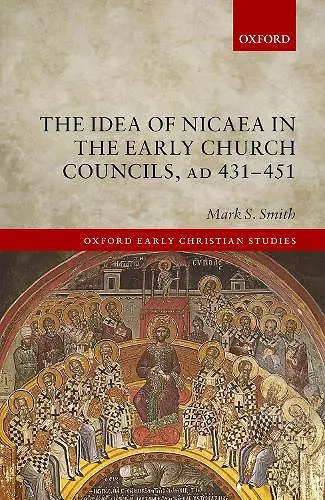The Idea of Nicaea in the Early Church Councils, AD 431-451
Format:Hardback
Publisher:Oxford University Press
Published:26th Dec '18
Currently unavailable, and unfortunately no date known when it will be back

The Idea of Nicaea in the Early Church Councils examines the role that appeals to Nicaea (both the council and its creed) played in the major councils of the mid-fifth century. It argues that the conflict between rival construals of Nicaea, and the struggle convincingly to arbitrate between them, represented a key dynamic driving--and unsettling--the conciliar activity of these decades. Mark S. Smith identifies a set of inherited assumptions concerning the role that Nicaea was expected to play in orthodox discourse--namely, that it possessed unique authority as a conciliar event, and sole sufficiency as a credal statement. The fundamental dilemma was thus how such shibboleths could be persuasively reaffirmed in the context of a dispute over Christological doctrine that the resources of the Nicene Creed were inadequate to address, and how the convening of new oecumenical councils could avoid fatally undermining Nicaea's special status. Smith examines the articulation of these contested ideas of 'Nicaea' at the councils of Ephesus I (431), Constantinople (448), Ephesus II (449), and Chalcedon (451). Particular attention is paid to the role of conciliar acta in providing carefully-shaped written contexts within which the Nicene Creed could be read and interpreted. This study proposes that the capacity of the idea of 'Nicaea' for flexible re-expression was a source of opportunity as well as a cause of strife, allowing continuity with the past to be asserted precisely through adaptation and modification, and opening up significant new paths for the articulation of credal and conciliar authority. The work thus combines a detailed historical analysis of the reception of Nicaea in the proceedings of the fifth-century councils, with an examination of the complex delineation of theological 'orthodoxy' in this period. It also reflects more widely on questions of doctrinal development and ecclesial reception in the early church.
This is a meticulous and perspicuous debut monograph. It is densely but very well written with some delightful turns of phrase (it is a long time since I found "pettifogging" in a book of historical theology!). Mark Smith is to be congratulated on an original and valuable contribution to the study of the councils in their historical context. The book deserves a wide readership. * Marcus Plested, Church History *
...The Idea of Nicaea is a clear, persuasive, and significant study of the making of Christian orthodoxy in late antiquity; it will definitively reshape discussions of the Council of Nicaea, and thus, of the early history of the diverse churches that claim its legacy. * Christine Shepardson, University of Tennessee, Knoxville, Religious Studies Review *
Smith's study offers important insight into the development of divergent perspectives on creedal and conciliar authority and the ecclesiastical disputes—further complicated by imperial intervention and imposition—that engendered them. * Young Richard Kim, Onassis Foundation USA, Review of Biblical Literature *
This admirable book is more than a specialist study of one chapter in the history of Christian doctrine: it provides a model for defining the nature of doctrinal development in any age. * Richard Price, Zeitschrift für Antikes Christentum *
this book provides an analysis of the christological controversy of 431-51 that outdoes all others in its study of a full range of contemporary documents and scrupulous fidelity to how the competing factions understood and conducted the debate. It will be necessary reading for all students of the meaning and history of this central topic in the history both of the church politics of the period and of the development of Christian doctrine. * Richard Price, Royal Holloway, University of London, Scottish Journal of Theology *
excellent study * Professor Mark Edwards, Church Times *
Mark Smith's Idea of Nicaea is superb -- Dr. Paul Gavrilyuk
ISBN: 9780198835271
Dimensions: 236mm x 163mm x 19mm
Weight: 514g
246 pages